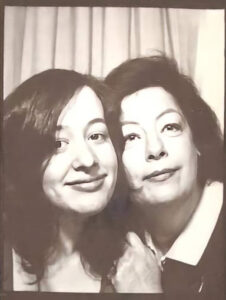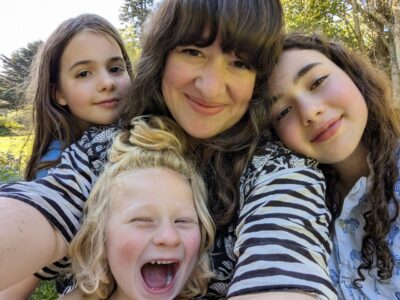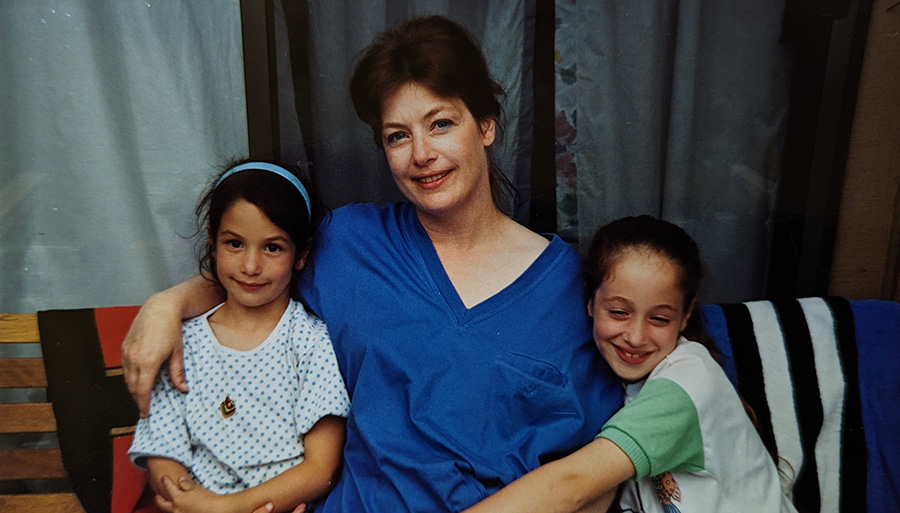Laura Marshall lives with her husband and three children in a home of their own on Bainbridge Island, something her mother, a lifelong renter, always dreamed of. This spring, she hosted a fundraiser for HRB to help make homeownership more accessible to people like her. [Photo: Laura shown with her mother and sister (left).]
In May, Laura Marshall had a party for her friends, her community, and the memory of her mother. It was a garden party, and since there was a slight chance of rain, the guests wore rain-themed clothing, conjuring rainbows and raindrops on what turned out to be an overcast but dry day. It was also a fundraiser for HRB, specifically for a new fund that will provide down payment assistance to homebuyers and that will be created in honor of her mother, a longtime Bainbridge Island resident and lifelong renter. The setting for the party was Laura’s home at the southern end of the island, where she has lived with her husband and three children since moving back to Bainbridge in 2019. “It is a home that my mother would have loved,” she says. “It has an ADU that she would have lived in.”
 Kerry Forrester passed away in 2011 at the age of 60, when the first of Laura’s three children was just 8 months old. “I reflect on this often,” Laura says. “There are so many things that you that learn about life once you become a parent, and so there was so much about my mother’s life that hit me only since I’ve become a mother that I wish that I could talk to her, but I can’t. There is so much about her life as a single mother that is just like, ‘How did you do it? How did you manage two kids on your own?”
Kerry Forrester passed away in 2011 at the age of 60, when the first of Laura’s three children was just 8 months old. “I reflect on this often,” Laura says. “There are so many things that you that learn about life once you become a parent, and so there was so much about my mother’s life that hit me only since I’ve become a mother that I wish that I could talk to her, but I can’t. There is so much about her life as a single mother that is just like, ‘How did you do it? How did you manage two kids on your own?”
Like so many others, Kerry, born and raised in Bremerton, moved to Bainbridge Island for the schools. But money was a constant struggle for this divorced mother of two who worked a string of jobs—a bank teller for a time, many years as a paralegal in Seattle. “Owning a house was her absolute dream,” her daughter recalls. “She talked about it all the time. She just wished she had a garden and could put down roots.” Kerry raised Laura and her younger sister in the Winslow Park Condominiums where they lived for 15 years. But despite this long residency, housing insecurity was ever present, every call from the landlords, an occasion for fear. Would they raise the rent or make them move? Ultimately, the latter came to pass.
Laura’s mother never learned to drive. And so the family had to live in Winslow within walking distance of amenities (though back in the day, Laura recalls, offers of rides, even from strangers, were commonplace). Travel by foot and a face that invited goodwill and conversation made Kerry a known and adored figure downtown. Laura loved her “small town childhood with access to the big city,” and the omnipresence of water became a “part of her soul,” keeping her tethered to a large body of water throughout her life despite multiple moves.
Laura always knew she would return home to Bainbridge, and when the time felt right to move back, her husband left academia for a job at Meta—and the salary that would make the move possible. The increase in income also enabled the couple to think more strategically about their personal philanthropy. And as the garden-party fundraiser attests, it truly is personal. There is her mother, of course, and there is also her dear friend from childhood, Jackie Brasefield who is HRB’s homeownership program manager and who steered her toward HRB when she was searching for a way to both honor her mother and support her community.
 Laura did not require much nudging. Her advocacy for affordable housing is informed not only by childhood experience but also her vision for a more inclusive, vibrant community. “There needs to be diverse options for a diversity of experiences here on the island. If we want families or people who are not all exactly the same, we need housing that is not all exactly the same and at the same price point.” Laura met with Sophia Blamey, HRB’s fund development director, to determine how her desire to create a fund in her mother’s honor and her commitment to growing it with future parties and solicitation of friends and family could best contribute to HRB’s work. They decided on down payment assistance in the form of a revolving, no-to-low interest loan that would only come due when the home was sold and could be repaid from the proceeds.
Laura did not require much nudging. Her advocacy for affordable housing is informed not only by childhood experience but also her vision for a more inclusive, vibrant community. “There needs to be diverse options for a diversity of experiences here on the island. If we want families or people who are not all exactly the same, we need housing that is not all exactly the same and at the same price point.” Laura met with Sophia Blamey, HRB’s fund development director, to determine how her desire to create a fund in her mother’s honor and her commitment to growing it with future parties and solicitation of friends and family could best contribute to HRB’s work. They decided on down payment assistance in the form of a revolving, no-to-low interest loan that would only come due when the home was sold and could be repaid from the proceeds.
“You can work so hard to be able to afford the mortgage payments,” says Laura, “but to be able to get ahead of the game, enough that you can put a down payment on something, is so hard. Almost everyone I know that buys a house does so with family money, at least in part. For generational wealth to be a requirement for homeownership is absurd, and so I feel like if we can help people get their foot in the door of the homeownership cycle, that‘s the best because once you get on that train you can stay on it. It’s so hard to scrape by and get ahead. I don’t know how people do it.”
Laura hopes HRB buyers who purchase a home with help from this fund will find things a little easier. And when those homeowners sell, the funds that helped them will be passed on to other homebuyers, and so on and so forth into the future. Today, Laura is not only living her mother’s dream, but helping to share it with others.
